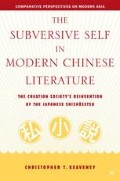Abstract
The two Creation Society stories examined in chapter 4, “Caishiji” and “Halfway,” provide examples of the relatively subtle ways in which Creation Society writers embedded criticism of contemporary Chinese society in their self-referential narratives. A consideration of several, more orthodox examples of self-referential stories by the Creation Society reveals an even greater degree of social criticism and even more conclusive evidence of the manner in which the shishôsetsu was transformed beneath the pens of the Creationists into a flexible tool for probing deficiencies of contemporary China and condemning anti-Chinese attitudes and official policies in Japan.
Access this chapter
Tax calculation will be finalised at checkout
Purchases are for personal use only
Preview
Unable to display preview. Download preview PDF.
Notes
Itô Toramaru, “Chuangzaoshe yu Riben wenxue,” Zhongguo xiandai wenxue yanjiu (March 1986), 213.
Zhu Defa, Zhongguo wusi wenxue shi (Shandong: Shandong wenyi chubanshe, 1986), 554.
James N. Stull, Literary Selves: Autobiography and Contemporary American Nonfiction (Westport, Conn.: Greenwood Press, 1993), 5.
Anna Dolezalovâ, Yü Ta-fu: Specific Traits of His Literary Creation (London: C. Hurst and Company, 1971), 22.
Guo Moruo, “Weiyang” (Halfway), in Chen Huangmei, ed., Chuangzaoshe ziliao (Fujian: Fujian renmin chubanshe, 1985), 1: 13–32.
Originally appeared in the Creation Quarterly 1: 3 (Fall 1922), 19.
Theodore Huters, “Lives in Profile: On the Authorial Voice in Modern and Contemporary Chinese Literature,” in From May Fourth to June Fourth: Fiction and Film in Twentieth Century China, ed. Ellen Widmer and David Der-wei Wang (Cambridge, Mass.: Harvard University Press, 1993), 269.
Wang Jinhou, Wusi: xinwenxue yu waiguo wenxue (May Fourth: The New Literature and Foreign Literature) (Sichuan: Sichuan daxue chubanshe, 1989), 62.
Paula Harrell, Sowing the Seeds of Change: Chinese Students, Japanese Teachers, 1895–1905 (Stanford, Calif.: Stanford University Press, 1992), 69
Yu Dafu, “Blue Smoke” (Qingyan). Originally appeared in Chuangzao Zhoubao, 8, 1923. Reprinted in Chen Huangmei, ed., 1: 116–122.
Xu Zidong, Yu Dafu xinlun (New Essays About Yu Dafu) (Hangzhou: Jiejiang wenyi chubanshe, 1984), 225.
Irmela Hijiya-Kirschnereit, Rituals of Self Revelation: Shishôsetsu as Literary Genre and Socio-Cultural Phenomenon (Cambridge, Mass.: Harvard University Press, 1996), 300.
Lydia H. Liu, Translingual Practice: Literature, National Culture and Translated Modernity (Stanford, Calif.: Stanford University Press, 1995), 95.
Bonnie S McDougall, The Introduction of Western Literary Theories into Modern China: 1919–1925 (Tokyo: Center for East Asian Cultural Studies, 1971), 201.
Eric Rothstein, “Diversity and Change in Literary Histories,” in Jay Clayton and Eric Rothstein, eds., Influence and Intertextuality in Literary History (Madison, Wis.: University of Wisconsin Press, 1991).
Perry E. Link, Mandarin Ducks and Butterflies (Berkeley, Calif.: University of California Press, 1981), 161.
Copyright information
© 2004 Christopher T. Keaveney
About this chapter
Cite this chapter
Keaveney, C.T. (2004). The Limits of Subversion: Political and Social Critique in the Creation Society’s Early Fiction. In: The Subversive Self in Modern Chinese Literature. Comparative Perspectives on Modern Asia. Palgrave Macmillan, New York. https://doi.org/10.1057/9781403980984_6
Download citation
DOI: https://doi.org/10.1057/9781403980984_6
Publisher Name: Palgrave Macmillan, New York
Print ISBN: 978-1-349-52823-3
Online ISBN: 978-1-4039-8098-4
eBook Packages: Palgrave Literature & Performing Arts CollectionLiterature, Cultural and Media Studies (R0)

